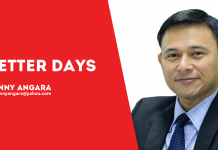DESPITE the strong rains and heavy traffic last week, it was inspiring to see the considerable attendance at the 6th Annual Convention of the Philippine Society of Geriatrics and Gerontology (PSGG), which I keynoted. Inspiring, because much like myself and many others, we often do not think about growing old.
The Philippines is enjoying a “demographic sweet spot.” This is where the size of a country’s working-age population is relatively larger than its dependents (either too young or too old to work). Research shows that almost 60 percent of Filipinos are of working-age with their median age at roughly 24 years old.
Ours is a young population, imbued with much productive potential. But while we enjoy this advantage now, this does not render us invulnerable to aging and its associated problems that currently grip many developed nations today.
Japan is the foremost cautionary tale, facing the aging problem in two fronts. On one hand, over 25 percent of their population are already “senior citizens.” Out of some 120 million Japanese, 70,000 are over the age of 100. On the other hand, the country is experiencing a significant decline in their birth rate. Just last year, they recorded the lowest number of newborns since 1899 at 940,000.
These developments have resulted in decreased productivity, increased spending on social pension and healthcare, and shortage of workers. One report from a diaper manufacturing company in Japan even said that adult diapers now outsell baby diapers.
Aging is a path all of us will take. Hence, the Philippines should make efforts now to ensure that the path ahead is paved and well-lit.
Of course, our government has already started giving back to senior citizens. My father, the late Sen. Edgardo J. Angara, created the Senior Citizens Law which gave our elderly discounts on particular goods and services. We expanded this law, exempting senior citizens from the 12 percent VAT and mandating government to give a social pension to all indigent senior citizens.
The Senate is also in the middle of refining the Universal Healthcare Coverage Bill, so PhilHealth coverage will include preventive, promotive, curative and palliative services. In particular, we strongly pushed for the inclusion of free check-ups and lab tests for all — including our elderly.
Our health systems however are ill-equipped to deal with aging. With a senior-citizen population of around 8 million, the country has only 140 geriatricians — half of whom do not even have actual clinic or hospital experience.
Currently, we are looking into the institutionalization of the National Center for Geriatric Health (NCGH). The NCGH is intended to be the country’s center for aged care and main venue for training and research on geriatric medicine and gerontology. But without an enabling law, funds are apparently hard to come by. According to the PSGG, the institutionalization of the NCGH will be the proportional response to the current and future challenges we face because of aging.
How we treat and give importance to our elders is a barometer of how we treat our society’s most vulnerable. It is also a reflection of how we give importance to our nation’s history and identity. Therefore, it is incumbent upon the younger generations to provide the care and support for them, and to think about their own aging, now.
***
Sen. Sonny Angara was the representative of Aurora Province for nine years before he was elected senator in 2013. He is now the chairman of the Senate committees on local government, and ways and means. (Email: sensonnyangara@yahoo.com| Facebook, Twitter & Instagram: @sonnyangara)/PN

